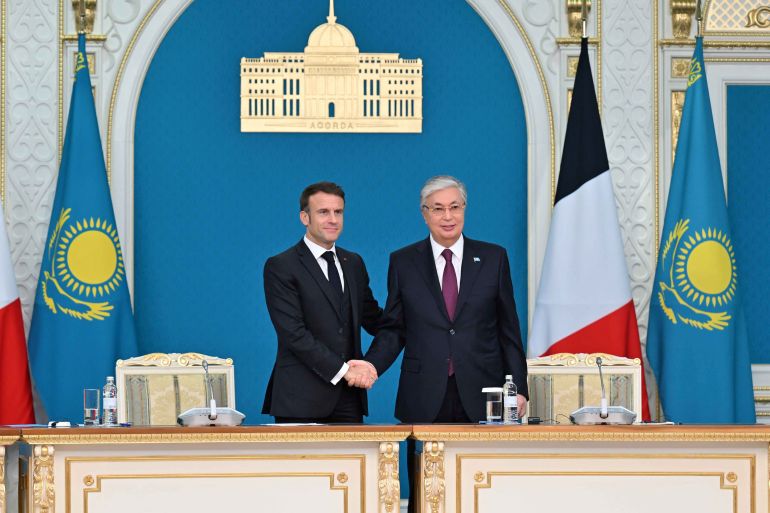Macron visits Kazakhstan on strategic tour of Central Asia
The French president is seeking to compete with Russia and China for influence in Central Asia.

French President Emmanuel Macron is touring Central Asia as he seeks to strengthen ties in the region where Russia and China enjoy strong influence.
The French leader met Kazakhstan’s President Kassym-Jomart Tokayev on Wednesday, holding talks to “accelerate cooperation” in key sectors. He will head to Uzbekistan next.
Keep reading
list of 3 itemsKazakhstan decides to stop hosting Syria talks, surprising Russia
Russian official accuses West of ‘manipulation’ in Kazakhstan
During the meeting with Tokayev, the pair signed a number of agreements covering economic sectors, including critical minerals vital for clean energy technologies, pharmaceuticals, and aerospace.
“The strength [of our partnership] demonstrates the good strategic direction that has been taken, and the need to complement and accelerate it,” Macron said at a news conference in the Kazakh capital, Astana.
Tokayev called France a “key and reliable partner” in the European Union and said he would seek to give the partnership “extra impetus”.
France is the fifth-biggest foreign investor in Kazakhstan and the longstanding relationship includes the massive Kashagan offshore oilfield project partnered with French energy giant TotalEnergies, as well as a uranium mine run by French company Orano, the head of which is among Macron’s delegation.
French energy giant EDF is also in the running to build Kazakhstan’s first nuclear power station.
Russia’s back yard
Kazakhstan has pulled away from the Kremlin in recent years. Astana refuses to recognise the legitimacy of breakaway states in Ukraine and complies with Western sanctions against Moscow.
The country’s leaders have pursued steps to establish strong strategic partnerships with Western countries, and Kazakhstan is supplying crude oil to European nations which refused to buy Russian oil.
With the war in Ukraine keeping Russia occupied, other powers are raising their efforts to strike strategic partnerships in the resource-rich Central Asian region.
Russia has voiced concerns over Western aspirations in its “back yard”.
Foreign Minister Sergey Lavrov said last week the West was trying to pull Russia’s “neighbours, friends and allies” away from it.
This is not the first time Moscow has voiced concerns over Western ventures in Central Asia in recent months.
“The United States and their allies are trying to support nationalist sentiment, spreading lies, manipulating public opinion, including through the internet and social networks,” Alexander Shevtsov, a deputy of Russia’s Security Council, said in June.
At the same time, China has forged strong links with Kazakhstan in recent years. It has ploughed huge investments into infrastructure – especially energy projects – and the country is an important link in Beijing’s China-Europe trade route that bypasses Russia.
Not underestimating ‘pressure’
Macron complimented Astana for refusing to side with Moscow on Ukraine, saying, “I do not underestimate by any means the pressure that some actors may be putting on you.”
“We will be able to make progress on important international matters, underscore our commitment to the United Nations charter and principles such as territorial integrity and national sovereignty,” Macron assured.
“This is the path for your country which refuses to be a vassal of any powers, and wants to maintain balanced relations with different countries in the interest of your people. Such a strategy is close to France.”
Macron heads to Uzbekistan next in a first visit to the country by a French leader since 1994.
China is particularly active in Central Asia with its “New Silk Road” project and a plan to take on a leadership role in the region.
Chinese President Xi Jinping unveiled an ambitious plan for Central Asia’s development at a Group of Seven (G7) summit in May.
Beijing plans to upgrade bilateral investment agreements and increase cross-border freight volume with the region, which would encourage Chinese-funded businesses in Central Asia to create more jobs, build warehouses, and launch a special train service aimed at promoting tourism.
“To bolster our cooperation and Central Asian development, China will provide Central Asian countries with a total of 26 billion yuan [$3.5bn] of financing support and grants,” Xi said.
Turkey has also shown a growing interest in the region. Turkish President Recep Tayyip Erdogan is due to visit Astana on Thursday and Friday, shortly after Macron.